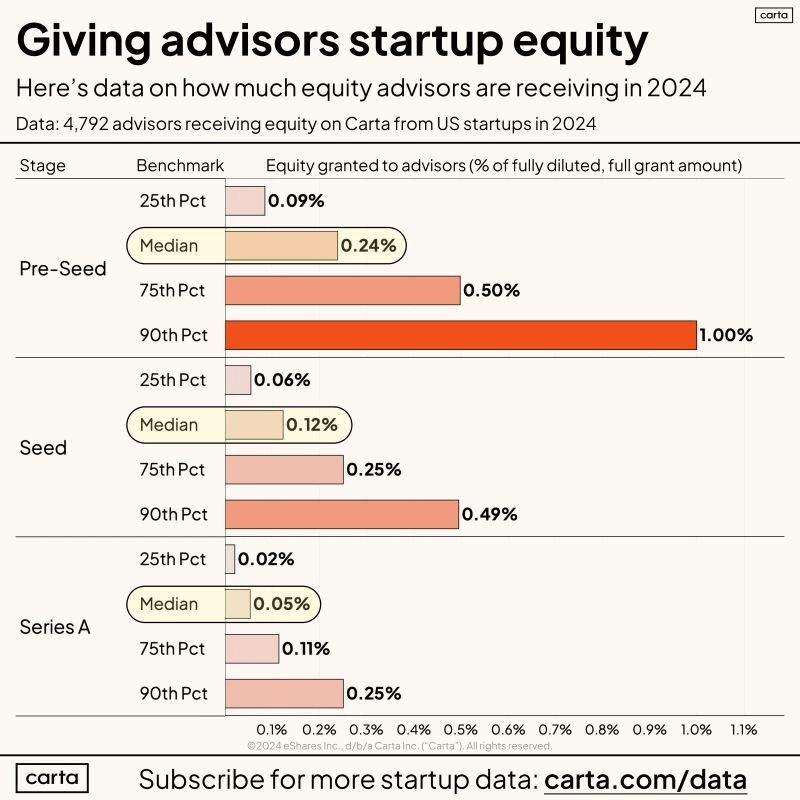
In the early stages of a startup, founders often seek out advisors to help navigate the complex world of entrepreneurship. Advisors bring experience, industry knowledge, and valuable networks that can significantly accelerate a startup’s growth, particularly for first-time founders. But one of the most important considerations during these relationships is how much equity to offer in exchange for this guidance.
The negotiation of equity for startup advisors is a delicate process. Founders must strike a balance between offering enough equity to motivate and reward advisors while ensuring they retain enough ownership to incentivize their own long-term involvement and that of future employees or investors.
This article delves into the dynamics of advisor equity, the value advisors bring, and what data from Carta and other sources reveal about typical equity arrangements.
Table of Contents
The Role of Advisors in Startup Success
Startup advisors can have an outsized impact on the success of a venture, especially for founders who are navigating uncharted territory. Advisors often come with deep industry expertise, connections to key players, and the strategic vision that many early-stage founders lack.
This is particularly true for first-time founders, who may not yet have the experience to manage scaling, fundraising, or forming partnerships effectively.
For example, a well-connected advisor might introduce a startup to its first few key customers, help secure a critical partnership, or even assist in raising the next round of funding.
These contributions can be game-changing and justify the allocation of equity. However, the challenge comes when trying to determine how much equity to offer in return for these services, and how to ensure that the compensation reflects the value delivered.
Equity Grants for Startup Advisors: What the Data Shows
A common benchmark for advisor equity in early-stage startups comes from Carta’s 2024 data, which provides a snapshot of how startups are compensating their advisors. According to Carta, the median equity grant for pre-seed advisors is 0.25% of fully diluted equity.
While this might seem small, it’s important to put this figure in context. First full-time employees at pre-seed companies typically receive a little over 1% equity, meaning that 0.25% for an advisor can be seen as a reasonable allocation, given that advisors are usually not involved full-time.
Interestingly, only 1 in 10 pre-seed advisors receive 1% or more of a startup’s equity, showing that higher equity grants are relatively rare. These top-end grants are often reserved for advisors with “brand-name” recognition, deep industry expertise, or extensive networks that bring immediate value to the startup.
AngelList data aligns closely with Carta’s findings, showing that advisor equity typically falls between 0.1% and 0.5%for pre-seed and seed-stage companies. This range can vary based on factors like the advisor’s experience, the industry in question, and the specific needs of the startup.
Factors That Influence Equity Compensation
When negotiating equity with advisors, several factors come into play that can significantly influence the amount of equity granted. Understanding these factors helps founders make informed decisions and avoid over- or under-compensating advisors.
1. Advisor Expertise and Brand Value
Top-tier advisors often have deep connections and influence within their industries, which can dramatically accelerate a startup’s growth. In such cases, founders might be more willing to offer higher equity.
Advisors with established reputations, particularly in specialized sectors like biotech, hardware, and medical devices, can command up to 1% or more in equity, especially when they bring value that is difficult to find elsewhere.
Carta’s data shows that advisors in specialized industries tend to receive higher equity grants because their knowledge is both niche and crucial to the startup’s success. For instance, an advisor in the biotech field who can help navigate regulatory hurdles or connect the startup to essential research partners is likely to receive more equity than a general business advisor.
2. Performance-Based Equity
To ensure that advisors deliver measurable value, startups are increasingly tying equity grants to performance metrics. For example, advisors may receive equity contingent on meeting specific goals, such as introducing the founder to two key hires or securing a strategic partnership. This approach benefits both parties: the founder feels confident that the equity is tied to tangible outcomes, while the advisor has clear targets to work toward.
This trend is supported by Founder Institute data, which highlights that performance-based equity grants are becoming more common, particularly in industries where direct results are essential to the startup’s success. This method helps to ensure that equity grants are justified and that the advisor’s involvement continues to add value over time.
3. Advisor Involvement and Commitment
The amount of time an advisor commits to a startup is another critical factor. Advisors who are highly involved, attending weekly meetings, making frequent introductions, and providing ongoing strategic guidance, might negotiate for higher equity than those who offer advice on a more ad-hoc basis.
Capshare data suggests that founders should carefully evaluate the expected involvement of an advisor before offering equity. Advisors who only provide occasional advice may not warrant large equity grants, while those deeply integrated into the startup’s development could justify more significant stakes.
Strategic Use of Equity for Founders
For startup founders, equity is one of the most valuable tools they have to incentivize and reward key contributors. However, it is also a finite resource, and over-dilution can become a real concern as more advisors and early employees are brought on board.
Carta’s data shows that most startups have only 1-2 advisors, with very few companies maintaining large advisory boards. This is because granting too much equity to too many advisors can quickly dilute the founder’s ownership, making it more difficult to attract future investors or employees with meaningful equity packages.
To manage this, many founders limit their advisory board size and offer equity in smaller amounts, sometimes as low as 0.1-0.25%. By keeping the advisory group small and strategic, founders can maintain enough equity to motivate future hires and secure investor interest while still compensating advisors fairly for their contributions.

Advisors as Strategic Angel Investors
Another emerging trend in the startup ecosystem is the dual role of advisors as strategic angel investors. Carta’s analysis shows a growing number of advisors also investing financially in the startups they advise, aligning their financial incentives with the company’s success. This arrangement benefits both parties: the advisor becomes more committed to the startup’s growth, and the founder gains not just advice but also additional capital.
First Round Capital has observed a similar trend, noting that advisors who invest in the companies they advise tend to be more involved and proactive, as their financial success is tied directly to the startup’s performance. This dual role can strengthen the relationship between founders and advisors, ensuring long-term collaboration.
Equity and the Broader Funding Landscape
When structuring equity for startup advisors, it’s important to view these decisions within the larger capital landscape. While founders often think primarily about venture capital as the primary source of growth funding, the reality is that private equity plays a role at later stages, particularly as firms look for equity investments in more established companies. Startups granting advisor shares today are essentially building the foundation for tomorrow’s investor conversations, whether those involve venture capitalists, private equity firms, or even hedge funds that manage diversified funds. By aligning advisor compensation with future investment opportunities, founders create both trust and credibility in how they manage ownership and capital structure.
Balancing Growth, Equity, and Future Investors
For founders, the real challenge lies in balancing advisor equity with the expectations of future investors. Many venture capital firms focus on high-risk, high-growth potential, while pe firms target mature companies with proven profitability and consistent revenue. Both types of firms analyze advisor equity as part of the overall ownership picture to ensure the company is well-positioned for long-term financing events, from additional funding rounds to an eventual initial public offering. By striking the right balance early, startups not only retain top advisors but also build a strong foundation that appeals to the full spectrum of future venture capitalists, private equity investment professionals, and other capital partners.
Conclusion: Finding the Right Balance in Equity Negotiations
Negotiating equity for startup advisors requires a careful balance between recognizing advisors’ value and maintaining sufficient ownership for founders and future stakeholders. Data from Carta, AngelList, and other sources suggest that a median equity grant of 0.25% for pre-seed advisors is common. However, higher grants may be justified in cases where advisors bring specialized knowledge or significant networks.
Founders should also consider tying equity grants to performance metrics to ensure advisors deliver measurable value. Keeping advisory boards small and strategic helps prevent over-dilution, preserving equity for future hires and investors.
Ultimately, the key is to ensure that advisors are fairly compensated for their contributions while keeping the long-term equity structure of the company sustainable.
By following best practices and making data-driven decisions, founders can build solid advisory relationships that contribute meaningfully to their startup’s growth and success.
To delve deeper into these strategies and connect with like-minded entrepreneurs, we invite you to join our free Founders Meeting. This interactive session offers data-driven insights, best practices, and personalized guidance on crafting an effective advisory board and managing equity. It’s a valuable opportunity to network, ask questions, and gain firsthand knowledge to help your startup thrive. Sign up now and take a vital step toward ensuring your long-term success.

